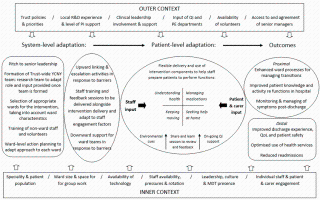Improving transitions from hospital to home: Using ‘real world’ logic models to derive learning from a feasibility trial of a ‘hybrid intervention’
Conference presentation
Mills, T., Baxter, R., Shannon, R., Murray, J., Lawton, R. and O'Hara, J. (2020). Improving transitions from hospital to home: Using ‘real world’ logic models to derive learning from a feasibility trial of a ‘hybrid intervention’. Health Services Research UK.
| Authors | Mills, T., Baxter, R., Shannon, R., Murray, J., Lawton, R. and O'Hara, J. |
|---|---|
| Type | Conference presentation |
| Abstract | Background: ‘Hybrid interventions’, a combination of common and variable elements (Lilford, 2018), are increasingly common in intervention research. Allowing interventions to adapt on delivery via variable elements should enhance their effectiveness but intervention complexity can be a barrier to implementation (Carrol et al, 2007). Very little literature exists regarding the challenges of implementing hybrid interventions in trials. Here, we report some key learning from a cluster randomised controlled feasibility trial that sought to assess a hybrid intervention called ‘Your Care Needs You’ (YCNY). The YNCY intervention was developed to improve the safety and experience of older people as they transition from hospital to home. Its common elements include a patient-friendly booklet, short film and discharge letter, which, when supported by staff, may help prepare patients for discharge, primarily through the mechanism of patient involvement (O’Hara, 2020). It is anticipated that patients will read the booklet and ask questions. Ward staff will, in turn, be supported to respond in ways that will vary in accordance with patients’ unique needs and preferences. Method: A qualitative assessment of feasibility was conducted in 5 diverse hospital wards across three acute NHS trusts, involving observations and both staff (n-17) and patient (n-10) interviews. Data were analysed using pen portraits (Sheard et al, 2019), thematic analysis techniques (Guest et al, 2011) and a ‘real world’ logic model (Mills et al, 2019), which express how complex interventions work in context. Here, we juxtapose some key findings of the research with the learning points that will be taken forward into the trial, using the logic model to convey how the intervention will be implemented in the trial. Results: Staff and patients generally viewed the YCNY intervention favourably but a lack of staff time, unclear staff roles and confusion about how the intervention related to recruitment processes complicated delivery. A tick box approach was sometimes adopted where staff focused on delivering of intervention components rather than on how staff can prepare patients for home. Key learning for the trial relates to the importance of extensive facilitation during the early stages of study set-up and a lengthier embedding period. Facilitators must leverage organisational resources and overcome technological and policy-regulatory barriers early on to create a ward environment that is conducive to the intervention’s delivery. Staff training will also have to be flexible, giving staff clarity over roles while allowing roles to flex by ward. As the logic model expresses (see Figure 1), early set-up work will itself have to ‘flex’ to each Trust environment, constituting a distinct stage of system-level adaptation prior to a stage of patient-level adaptation. Implications: Significant learning can be derived about how to implement hybrid interventions during the early stages of complex intervention development. ‘Real world’ logic models, which have not yet been used in a trial setting, represent a viable analytic technique for expressing such learning. A key benefit of the approach is how it represents the implementation strategy, interventions and delivery settings in a single model, allowing synergies between them to be assessed. |
| Keywords | Logic models, complex interventions, evaluation, transitions |
| Year | 2020 |
| Web address (URL) | https://www.youtube.com/watch?v=Fa19W7q3_A8 |
| Accepted author manuscript | License File Access Level Open |
| Publication dates | |
| 26 Jun 2020 | |
| Publication process dates | |
| Deposited | 05 Dec 2022 |
| Web address (URL) of conference proceedings | https://hsruk.org/conference-2020/presentations/learning-evaluation |
https://openresearch.lsbu.ac.uk/item/92vw3
Download files
Accepted author manuscript
 | Mills HSRUK 2020 - PACT.pptx | |
| PACT model.png | ||
| License: CC BY 4.0 | ||
| File access level: Open | ||
183
total views97
total downloads4
views this month1
downloads this month
